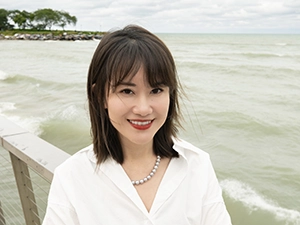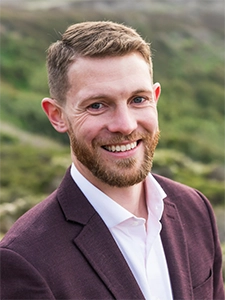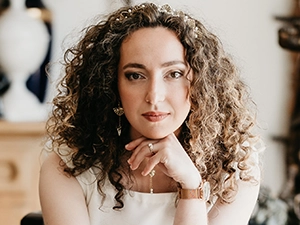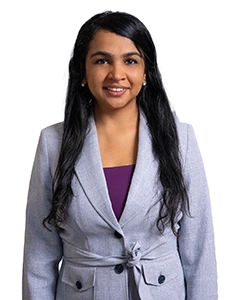New Faculty Bring Energy and a Collaborative Spirit to Northwestern
New faculty have joined Northwestern University this fall – several with a special interest in sustainability and energy topics. Their unique expertise brings opportunity for students from the classroom to the laboratories. It also sets the stage for discoveries that will lead to a more sustainable future.

Across the board, the new faculty referenced the collaborative nature of Northwestern as a significant reason for their decision to join the University. “I really like the interdisciplinary characteristic of Northwestern,” said Iza Ding, associate professor of political science. “As somebody who tries to draw insights from different disciplines and collaborate with scholars from different disciplines, I think this is the place for me.”

James Gaynor, assistant professor of chemistry, agreed. “The spirit of collaboration here is sort of the authentic sense of self.” Plus, he added, “I know that the science I can do within my group is going to be just exponentially better if I have people around me who really push new questions.”
Gaynor, an experimental physical chemist, arrived on the Evanston campus this fall with plans to pick up the pace. His research works with the fastest timescales that humans are able to measure, running niche experiments with students and other researchers that examine how molecules absorb and transfer energy. This research, he expects, will lead to more energy efficient devices in the future. “If we want to be, as a society, better at moving energy that molecules and materials can absorb, we need to know better how they absorb it, and what they do with it when they absorb it...only then do we actually have the requisite knowledge to intelligently tune and deliberately adjust our materials properties in a very directed way,” he said. Gaynor previously completed work that improved the understanding of how molecules that are placed onto the surfaces of solar cells and similar products can more efficiently move energy. He intends to continue that work at Northwestern in partnership with researchers in nanomaterials or others with backgrounds in synthetic inorganic or organic materials backgrounds in materials science. This work also has implications for next generation battery sources. Gaynor is a faculty affiliate of the Paula M. Trienens Institute for Sustainability and Energy. “I'm interested in answering questions that are going to enable applications to really flourish on a not so far off timescale,” he said. “I think it's going to be really productive for the field.”
 Meanwhile, Cecile Chazot, Julia Weertman Professor in Materials Science and Engineering, is setting up her lab to design new materials that can replace some current uses of plastics, such as in fabric and food packaging. “My research lab is called the sustainable polymer innovation lab, SPIN. The research we do is mostly in sustainable materials design for textiles and polymer application. We are really focused on designing new materials that are alternative to petroleum derived polymers and plastics,” she explained. “We also look at some textile recycling strategies.” For example, she is looking at ways to make spandex more recyclable, as there is currently no infrastructure for recycling the material. In addition, “For textiles, we try and make textiles that are colorful but dye free,” she said, adding that there is much room for improvement in the industry. Chazot, a faculty affiliate of the Trienens Institute, noted that the current dye process is responsible for 20% of water pollution. When it comes to food packaging, she is working to make biodegradable, bioderived materials to replace current materials that are derived from petroleum. “Sustainability is really at the heart of my lab’s research, that’s what we do. Along the way we answer a lot of interesting scientific questions,” she said.
Meanwhile, Cecile Chazot, Julia Weertman Professor in Materials Science and Engineering, is setting up her lab to design new materials that can replace some current uses of plastics, such as in fabric and food packaging. “My research lab is called the sustainable polymer innovation lab, SPIN. The research we do is mostly in sustainable materials design for textiles and polymer application. We are really focused on designing new materials that are alternative to petroleum derived polymers and plastics,” she explained. “We also look at some textile recycling strategies.” For example, she is looking at ways to make spandex more recyclable, as there is currently no infrastructure for recycling the material. In addition, “For textiles, we try and make textiles that are colorful but dye free,” she said, adding that there is much room for improvement in the industry. Chazot, a faculty affiliate of the Trienens Institute, noted that the current dye process is responsible for 20% of water pollution. When it comes to food packaging, she is working to make biodegradable, bioderived materials to replace current materials that are derived from petroleum. “Sustainability is really at the heart of my lab’s research, that’s what we do. Along the way we answer a lot of interesting scientific questions,” she said.
 Nivedita Arora, the Allen K. and Johnnie Cordell Breed Junior Professor of Design and assistant professor of electrical and computer engineering, brings her unique expertise in building sustainable computational materials to Northwestern. From the classroom to her research, her approach is interdisciplinary, and she is eager to collaborate across the curriculum to create computing devices that have low power requirements and a sustainable lifecycle. “One of my research agendas is to build battery free materials, which can do sensing, communication, and computation; but also...at the end of their lifecycle, you can responsibly decompose, or recycle them,” said Arora, who is also a faculty affiliate at the Trienens Institute. Her work has explored the possibility of weaving computational tasks into paper, such as sticky notes, or into fabric, to add functionality while seamlessly integrating into daily life. In the classroom, Arora is eager to help her students consider insights from multiple disciplines as they build devices for use with smart homes, health, accessibility, biodiversity, or urban infrastructure monitoring. The inclination to consider the full lifecycle of her products is second nature for Arora, who grew up in India with a philosophy of the world as one family, called Vasudhaiva Kutumbakam. “This has inspired me to think about sustainability at its core, to think really think about what I'm building and whether it is sustainable,” she said.
Nivedita Arora, the Allen K. and Johnnie Cordell Breed Junior Professor of Design and assistant professor of electrical and computer engineering, brings her unique expertise in building sustainable computational materials to Northwestern. From the classroom to her research, her approach is interdisciplinary, and she is eager to collaborate across the curriculum to create computing devices that have low power requirements and a sustainable lifecycle. “One of my research agendas is to build battery free materials, which can do sensing, communication, and computation; but also...at the end of their lifecycle, you can responsibly decompose, or recycle them,” said Arora, who is also a faculty affiliate at the Trienens Institute. Her work has explored the possibility of weaving computational tasks into paper, such as sticky notes, or into fabric, to add functionality while seamlessly integrating into daily life. In the classroom, Arora is eager to help her students consider insights from multiple disciplines as they build devices for use with smart homes, health, accessibility, biodiversity, or urban infrastructure monitoring. The inclination to consider the full lifecycle of her products is second nature for Arora, who grew up in India with a philosophy of the world as one family, called Vasudhaiva Kutumbakam. “This has inspired me to think about sustainability at its core, to think really think about what I'm building and whether it is sustainable,” she said.
In the Department of Political Science this quarter, Iza Ding is talking with her students about environmental governance in China, and China’s role in the global fight against climate change. These conversations are a natural part of her course on the Politics of China. “One cannot talk about sustainability and tackling these global challenges like climate change without thinking about China’s role in that,” she said. More broadly, her research aims to get at the politics about environmental pollution, climate change, and environmental governance. In addition, she said, “I’m interested in ideas of environmentalism and sustainability. I have research that’s on behavior, but I’m also interested in ideas and how that might affect the political, economic, social outcomes that we care about. Do people in different parts of the world share similar beliefs?” Ding has also studied a political shift that she refers to as the new politics of climate change. “In American politics, but also elsewhere, we still have this left versus right understanding of climate environmental politics and what I’m showing is how that’s been changing... Conservatives, especially young conservatives, care just as much about climate change [as democrats], they just disagree on the policy solution. That’s something I’m looking at in my research,” she noted.
Ding joins her new faculty colleagues in eagerly anticipating the collaborations to come. She is especially excited to meet “students in different social science and science disciplines who care about environmental and climate issues and are fascinated by the politics of those issues.” The possibilities for research partnerships seem endless to Arora, who envisions potential projects with disciplines such as materials science to medicine. “I'm very excited to be around this very exciting set of people,” she said. Arora is also energized by the innovation happening across the region. “I think there are a lot of avenues of collaboration in the Chicago area,” she added. Chazot, who is also a member of the Program on Plastics, Ecosystems, and Public Health (PEPH) network through the Trienens Institute, is inspired by her work with the polymer research community but wants to expand her discoveries through partnership with industry. “We all need to work together with the powerhouse of academic research and industry research and development to make those solutions that needed to happen years ago happen right now because we don’t have a lot of time to wait.”
Additional faculty who have recently joined Northwestern and work within sustainability and energy are:
- Rebecca Ewert - Assistant Professor of Instruction, Department of Sociology
- Elham Hoominfar - Assistant Professor of Instruction, Program in Global Health Studies
- Bryan Hunter - Assistant Professor, Department of Chemistry
- Diego Kanzig - Assistant Professor, Department of Economics


 Meanwhile,
Meanwhile,  Nivedita Arora
Nivedita Arora